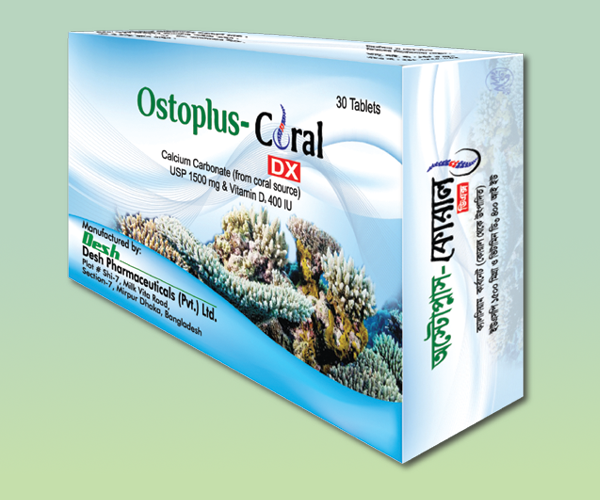Osto-Coral DX
Calcium Carbonate USP 500mg & Vitamin D 400 IU
Osto-Coral DX
Calcium Carbonate USP 500mg & Vitamin D 400 IU
Each Tablet Calcium Carbonate (Coral Source) USP 1500 mg equivalent to elemental calcium 600 mg and Vitamin D3 400 IU as Cholecalciferol USP.
- AVAILABILITY: AVAILABLE
Indication
It is indicated for the prevention and treatment of calcium and vitamin D deficiency.
Calcium and vitamin D supplement is used as an adjunct to specific therapy in the
prevention and treatment of Osteoporosis for patients who are at risk of calcium and vitamin D deficiency.
Dose & administration
Recommended Dose: 1-2 tablets daily.
Mode of administration: One tablet once or twice daily with plenty of water or as directed by the physician.
Contraindication
- Hypercalcemia and hyperparathyroidism
- Hypercalciuria and nephrolithiasis
- Hypersensitivity to the component of this preparation
- Severe renal insufficiencies
Warnings and precautions
In mild hypercalciuria, careful monitoring with reduction of dose is sufficient to return to normal serum calcium concentration. Plasma and serum calcium level should be monitored in mild to moderate renal impairment and also in case of long term use. Patients with renal stone or with such previous history should be recommended to increase their fluid intake.
Side effects
Flatulence, diarrhea, constipation, upper GI discomfort, allergic reactions etc. are rare manifestation. Hypercalcemia due to prolong use has rarely been reported.
Use in pregnancy and lactation
It should be given to pregnant and lactating mothers as per recommendation of physician.
Use in children & adolescent
Most children and adolescents aren’t getting the Calcium they need to build peak bone mass. For this reason, it’s of vital importance that your child gets enough Calcium on a daily basis.
Cholecalciferol in nursing infants:Mothers may breastfeed while taking Cholecalciferol, provided that the serum Calcium levels of the mother and infant are monitored.
Drug interactions
Oral calcium can reduce the absorption of tetracycline & fluoride preparations and minimum 3 hours time should be allowed between ingestion of these medications. Thiazide diuretics reduce the renal excretion of calcium. Phenytoin, barbiturates, glucocorticoids may induce metabolism of Vitamin D. Concomitant ingestion of certain foods like spinach, cereals, milk and its derivatives may reduce the intestinal uptake of calcium.
Calcium may interact with some medications and foods. First and foremost, you should follow the instructions of your doctor or pharmacist on how to take your calcium. Generally it is recommended that calcium supplements not be taken within one to two hours of another medication dose because it may impede the effects of the medication. Taking medications or supplements that have large amounts of calcium, magnesium, phosphates, or vitamin D may not be safe. Taking calcium with some medications can decrease the effectiveness of the medication, decrease calcium absorption, increase calcium levels dangerously, or even cause lung or kidney problems.
Calcium is known to interact with the following medications:
- bisphosphonates
- H2 blockers
- proton pump inhibitors (PPIs)
- fluoroquinolone antibiotics
- tetracycline antibiotics
- thiazide and thiazide-like diuretics
- ceftriaxone
- calcipotriene
- levothyroxine
- sotalol
Don't take calcium with large quantities of fiber-rich foods. Take the supplement one to two hours before or after you eat fiber. You shouldn't drink large quantities of caffeine (over eight cups of coffee in a day) or alcohol, with calcium, and you shouldn't smoke tobacco.
Overdose
Symptoms of overdose may include nausea and vomiting, severe drowsiness, dry mouth, loss of appetite, metallic taste, stomach cramps, unconsciousness, diarrhoea, weakness, headache, constipation, dizziness or irritability.
Storage
Store in a cool, dry place below 30 °C and protect from light. Keep out of reach of children.
Packing
OstoCoral Tablet: Box containing 3x10/5 x10 / 10x10 tablets in a blister pack.
